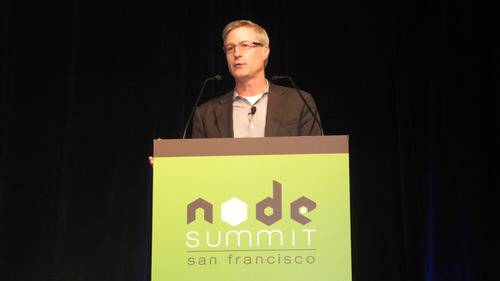
Last Tuesday, Joyent announced it was handing off the Node project to an independent foundation, seemingly a big step toward resolving the infighting that’s riven the open-source JavaScript framework.
But it didn’t answer one big question: How the Node Foundation is going to run, and whether it will fairly represent independent developers as well as the interests of large corporations. That basic tension underlies recent turmoil over Node, especially the decision by some developers to “fork” its codebase to create IO.js, a Node clone they can advance more rapidly than Joyent would allow.
See also: Joyent Waves A White Flag, Hands Off Node.js To A New Foundation
Dozens of developers are currently tweeting at Joyent CEO Scott Hammond as part of a grassroots campaign called Govern Node Right, urging the former corporate steward to run the foundation in an open manner similar to IO. The movement has picked up support from the likes of Isaac Schlueter, Node’s former project lead.
I support adopting @official_iojs's technical governance model in The Node.js Foundationhttp://t.co/7bOO3jGOQZ
— isaacs (@izs) February 19, 2015
Joyent had no comment on the campaign, though it’s doubtless aware of it.
It Matters Who Runs The Show
The Node Foundation is an obvious bid to reunify Node’s two communities. But as IO advocate Mikeal Rogers told me at Node Summit, nothing will change until the foundation lays out some rules for how it’s going to function.
“They have not yet adopted a technical governance model or accepted the IO.js governance model which we advocated they should do,” he said.
See also: Why The Node.js Summit Didn’t Solve Node’s Underlying Problems
The Node Foundation has a lot of big names on board, including IBM, Microsoft, PayPal, Fidelity and the Linux Foundation as founding members. Setting up governing rules will take another couple of months, Joyent CEO Hammond told me.
Developers, however, worry that the Node Foundation is considering a corporate trade association in the image of the Linux Foundation, which is advising the Node organization on its structure. Corporations can pay up $250,000 a year to reserve a spot on the Node Foundation and have a say in decision-making, which puts the power in the hands of the already powerful, not individual developers.
Meanwhile, IO dissidents have set up the open government they wanted but couldn’t get at the Joyent-led Node. The IO governance model is overseen by a technical committee consisting of IO’s most prolific contributors.
“Initial membership invitations to the [Technical Committee] were given to individuals who had been active contributors to io.js, and who have significant experience with the management of the io.js project,” according to the project’s GitHub page.
Individuals making “significant and valuable contributions” can be upgraded to project collaborators, who will have increased authority over the project and potential consideration for the technical committee. In other words, IO is set up to run by developers, for developers.
In a public statement on Medium, the IO project reaffirmed that it’s eager to reunify with Node. But, it added, “we can’t sacrifice the progress we’ve made or the principles and open governance that got us here.”
According to Schlueter, IO—which now calls itself a “friendly fork of Node.js“—and the Node Foundation continue to talk, and both sides agree on the importance of self governance and transparency. The trick is where to go from there.
“The devil is in the details,” he told ReadWrite. “The particulars of what we vote on vs. what decisions require strict consensus, the mechanism and requirements for adding new contributors, the structure of working groups, and so on, all have a significant impact on how the project operates.”
On Friday, IO released version 1.3.0 of its framework, its third major milestone since the fork. Schlueter said open governance model is a major factor in keeping IO running smoothly.
“We have seen this process produce very high-quality software by leveraging our community very effectively,” he said.
Photo of Joyent CEO Scott Hammond by Lauren Orsini for ReadWrite

















